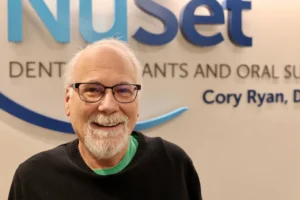Have you ever felt a sharp pain in your tooth while chewing? It can catch you off guard, and whether you’re eating something soft or biting into a snack, that pain can be uncomfortable and confusing.
Tooth pain like this doesn’t just happen for no reason and is often a sign of a small cavity or a cracked tooth. And often, it’s linked to dental work that needs attention.
It can feel a little scary not knowing what’s going on. But you’re not alone, and the good news is that most causes of tooth pain while chewing can be treated. Knowing what’s behind the pain is the first step toward feeling better.
Let’s discuss the possible causes, what the pain might mean, how to feel better at home, and when it’s time to see a dental specialist.
Key Takeaways
- Tooth pain when chewing is often caused by cavities, cracks, gum issues, or pressure from dental work.
- Front and back teeth can hurt for different reasons, based on how they’re used and where the problem is.
- Home remedies like saltwater rinses and soft foods can help for a short time, but they don’t fix the cause.
- If the pain lasts more than two days or gets worse, it’s time to see a dentist.
- Most chewing pain can be treated, and in serious cases, a dental implant may be the best solution.
Common Causes of Toothache When Chewing
Tooth pain while chewing can start small, and the cause isn’t always easy to spot, but here are the most common causes of toothache when chewing:
Tooth Sensitivity
If a tooth feels sore when you bite or press on it, it is possible the root is exposed. This happens when the enamel wears down, or the gums pull away. When this happens, everyday foods like soup or ice cream can turn painful.
Cavities or Tooth Decay
Tiny holes in your teeth can create big problems. Food particles get trapped in those damaged spots, causing sharp or throbbing pain. You may not see the hole, but your tooth may feel it every time pressure hits the wrong place.
Tooth Fractures or Cracks
Teeth can split or crack without warning, and a piece of popcorn or ice can even cause this. Even if the crack is small, it can open when you chew. That movement can stretch the nerve inside, causing sudden pain with each bite.
Gum Disease
Sometimes, the pain comes from the gums. Inflammation makes the area around the teeth swollen and tender. Chewing moves the teeth slightly, and when the gums are inflamed, even that small shift can feel sore. Back teeth often feel this more because they do the heavy lifting when you chew.
Dental Work That’s Off
Fillings and crowns need to fit right. If they’re too high or uneven, one tooth can carry more pressure than the others. That extra pressure builds up and turns into pain. A bite that feels a little off today can turn into a sore spot tomorrow.
Types of Tooth Pain: Front vs. Back Teeth
Not all tooth pain feels the same. Where it happens in your mouth can tell you a lot about what’s going on. Front teeth and back teeth have different jobs, and that means they run into different problems.
Front Tooth Pain
Pain in the front teeth often feels sharp or sensitive. These teeth don’t do as much chewing, so pain here usually points to surface issues. You could be dealing with gum recession, which leaves the roots exposed. Or there may be a small crack from biting your nails or grinding at night. Cold air or brushing too hard can also make front teeth ache.
Molar Teeth Pain
Back teeth handle most of the pressure when you eat. That pressure adds up, and these teeth are more likely to get cavities or cracks. If you feel a deep ache or sharp pain when chewing, a back tooth could be the source. Swollen gums around a molar can also make chewing feel uncomfortable.
How to Relieve a Toothache When Chewing
When your tooth hurts, even a small bite can feel like a big problem. While waiting to see a dental specialist, there are a few things you can do to feel better.
Home Remedies
Start with warm saltwater rinses. They clean the area and help reduce swelling. You can also take over-the-counter pain relievers to calm the ache. If the tooth feels sore or inflamed, a cold compress on the outside of your cheek can help numb the area.
Temporary Fixes
If the pain is from pressure or sensitivity, try switching to a soft toothbrush and toothpaste made for sensitive teeth. It helps ease the sting while protecting the enamel. You can also avoid chewing on that side of your mouth until you see a dentist.
While you’re waiting to see a dental specialist, stick to soft foods and skip anything crunchy, sticky, or hard. Keep brushing and flossing, but be gentle around the painful area. These tips won’t fix the cause, but they can make things easier while you wait for a proper diagnosis. And lastly, it’s important to seek professional help as soon as possible- a small pain can turn into a larger dental problem.
When to Seek Professional Dental Help
Pain when you chew, tap, or press on the tooth can mean there’s a crack, cavity, or nerve issue. Ignoring it might lead to more damage, or even tooth loss.
When you go to the clinic, your dentist will start by asking questions and checking your mouth. They may take X-rays to see what’s going on inside the tooth or under the gum. Depending on the cause, the dental specialist may recommend a filling, a crown, or a dental implant.
Dental Pain Treatment Options
Once your dental specialist understands what’s causing the pain, they can create a plan to help you feel better — and protect the tooth long-term.
If there’s a shallow cavity, the specialist will clean it out and place a filling.
In many cases, removal may be the best option. When that happens, we often recommend a dental implant. It replaces the missing tooth, looks natural, and helps you chew without pain again.
Ready to Stop the Pain? Let’s Help You Find the Cause
Relief starts with answers. The sooner you know what’s causing the pain, the sooner you can treat and prevent it from coming back.
If you’ve been dealing with tooth pain that won’t go away, the team at NuSet Dental Implants and Oral Surgery is here to help. We’ll examine the problem, explain your options, and guide you toward a solution that fits your needs..
Don’t wait for the pain to get worse. Schedule a consultation now and take the first step toward lasting relief.
Frequently Asked Questions
Why does my tooth hurt only when I chew?
Pain while chewing usually means something is irritating the tooth or the area around it. It could be a cavity, a small crack, inflamed gums, or pressure from dental work that doesn’t fit right. A specialist can pinpoint the cause with a quick exam.
Why is my tooth hurting when I bite down?
Biting pain can happen if a tooth is cracked, has deep decay, or is inflamed on the inside. Sometimes, the pain comes from a filling or crown that’s too high. Even if it feels small now, it’s best to get it checked before it worsens.
How do I stop my teeth from hurting when I chew?
Until you see a dental specialist, try rinsing with warm salt water, using a soft toothbrush, and avoiding hard or sticky foods. Desensitizing toothpaste can help if sensitivity is the cause. For lasting relief, your dentist will need to treat the root problem.
How do I know if my toothache is serious?
A toothache that lasts more than two days gets worse or comes with swelling, fever, or a bad taste in your mouth should be seen right away. These are signs of infection or damage that need quick care to prevent bigger issues.
How to tell if it’s gum or tooth pain?
Gum pain usually feels sore around the tooth and may come with redness, bleeding, or swelling. Tooth pain feels deeper and sharper, especially when biting or chewing. A dental exam can help figure out where the pain is coming from and what to do next.





